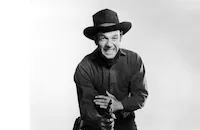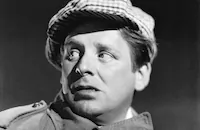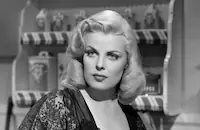Embraceable You

Brief Synopsis
Cast & Crew
Felix Jacoves
Dane Clark
Geraldine Brooks
S. Z. Sakall
Wallace Ford
Richard Rober
Film Details
Technical Specs

Synopsis
In New York City, after gambler Sig Kelch shoots a crooked poker player, the getaway car driven by Eddie Novoc strikes Marie Willens. Although Eddie is shaken by the accident, Kelch insists that he keep driving. Later, a concerned Eddie visits Marie at the hospital, pretending to be a friend of her brother. Police detective Ferris becomes interested in Marie's visitor after she tells him that she has no brother. Then Dr. Wirth discovers that Marie has an inoperable, fatal aneurism caused by the accident. Because nothing can be done for Marie, Wirth decides not to tell her that she is going to die. When she learns she is to be released from the hospital, a distraught Marie tells Ferris that she has lost her job and is locked out of her apartment. The next time Eddie visits Marie, Wirth tells him about her condition. Outside the hospital, Ferris informs him that, although he cannot prove it, he knows that Eddie was driving the car that hit Marie and orders him to take care of her until she dies. After failing to get the necessary money from Kelch, Eddie sells his car in order to rent Marie an apartment. Marie is delighted with her new home and calls her friend Libby to ask for help finding a job. Libby's agent, Matt Hethron, agrees to see Marie, but while demonstrating her specialty, a tap dance, she collapses. Eddie pawns his watch and then blackmails Kelch for enough money to support Marie, but soon realizes that Kelch's men are after him. With Ferris' help, Eddie plots to leave town with Marie. Having evaded Kelch and his men, Marie and Eddie live an idyllic life in the country until Marie's worsening attacks leave her unable to walk. Eddie summons Wirth, who finally tells Marie the truth about her condition. Now that Marie knows she is going to die, she asks Eddie to marry her. When he refuses, even though he loves her, Marie realizes that he was the person who caused the accident. She forgives him, however, and they agree to marry. In the city, Kelch's men have been watching Eddie's friend Sammy, and when one notices Eddie and Marie's names written on a wedding cake that Sammy has made, they follow him to the couple's hideout in the country. Unknown to Kelch, however, Ferris' men have also been watching Sammy's shop, and when Kelch tries to shoot Eddie, Ferris kills him first. Now that Ferris has resolved the gambler's murder, he wants to take Eddie to jail for the hit-and-run accident. Eddie begs to be allowed to marry Marie and to make her happy for the short time she has left to live. At first Ferris is unwilling, but persuaded by Eddie's love for Marie, finally agrees. After the wedding Marie asks Eddie to make believe that the marriage "is forever." Eddie kisses her and vows, "It is forever."

Director
Felix Jacoves
Cast

Dane Clark
Geraldine Brooks

S. Z. Sakall

Wallace Ford
Richard Rober

Lina Romay

Douglas Kennedy
Mary Stuart
Philip Van Zandt
Rod Rogers
Frederic Berest
Lester Dorr
Billy Kimberly
Charles Mcavoy

Paul Panzer
Cliff Clark
Charles Williams
Janet Barrett
Dick Bartell
Dave Barry
Joleen King
Creighton Hale
Ray Montgomery

Jack Mower
Rosa Barbato
Joel Friedkin
Donald Kerr

Cleo Moore
Gracille Lavinder
Jack Smart
Crew
Edna Anhalt
Aleck Block
Roy Davidson
Edwin Du Par
Saul Elkins
Carl Guthrie
Les Guthrie
Dietrich V. Hanneken
Stanley Jones
William Lava
Charles Maxwell
Don Page
Thomas Reilly
Ted Smith
William Wallace
Perc Westmore

Photo Collections
Film Details
Technical Specs

Articles
Embraceable You
They nudge Clark's gangland chauffeur, Eddie Novoc, into a couple of dangerous situations. When Eddie, troubled by his conscience, visits Brooks's Marie in the hospital with a made-up story to conceal his identity, he's relieved to learn she's recovering from the injuries he inflicted on her. And of course he falls for her. What he also doesn't count on is Wallace Ford's homicide detective spotting him and tying the hit-and-run to Eddie's boss gunning down a gambler, from which Eddie was whisking his employer, hulking Richard Rober, at top speed. The cop can't prove anything. But he lets Eddie know he plans to keep bulldogging him. He also tells Eddie he'll jail him on the hit-and-run unless he does the right thing by Brooks.
We immediately like her when we learn she's faking the extent of her injuries in hope of an insurance jackpot, broke as she is and having just been tossed out of her furnished room. What the doc doesn't tell her is that in examining her he discovered that she has an inoperable embolism and could die at any moment. Eddie finds this out, and given the cop's ultimatum, he does his best to right things, stuck as he is between two rocks (the cop and his murderous boss) and a soft place (Brooks). But when his boss tells him to get lost, he quickly exhausts his meager resources keeping Brooks in a style (flat in a Manhattan brownstone for the princely sum of $150 a month, nights on the town, and other diversions) to which she had been unaccustomed. To her annoyance, though, he's hesitant about dancing with her and insists on getting her home early.
Brooklyn-born Clark (1912-1998), who earned a law degree but couldn't find work in the '30s, bounced from employment as a boxer, baseball player, construction worker and model to acting after meeting arts-related connections in modeling. He went the customary film biz route, from small stage roles to small film roles to larger ones. He never quite made the A-list, but appeared opposite Bogart, Cary Grant, Bette Davis and Raymond Massey and enjoyed a solid, decades-long career. He prided himself on roles he described as "Joe Average" and liked working at Warner Brothers where, he maintained, you didn't need pretty boy looks to get ahead.
In Embraceable You, however, he's at a bit of a disadvantage. Because he knows how fragile she is and she doesn't (she finally learns toward the end), he's stuck with playing hesitancy while she's playing ardor in their scenes together. He comes across as halting - not what you want to see in a lover. Not that he has much choice when he knows one enthusiastic hug might kill her. With his callous, dismissive boss, it's a different story. When he runs out of money, he barges into Mr. Big's office and shakes him down for $1000 to keep silent about the murder. This, of course, turns him into target practice for the boss's thugs, and there's an exciting ambulance chase when the cop whisks Eddie and Marie to safety. Well, temporary safety.
Brooks, who died tragically young at 52, is, in the manner of doomed heroines, luminous, a brunette beauty with shining eyes and a dazzling smile. And her down-to-earth working-girl moxie is a plus. The script works to keep the treacle at a minimum, and she's a big reason it does. Embraceable You is also another reminder of how deep the studio rosters were in supporting talent. S.Z. Sakall, the jowly, cherubic Hungarian, pretty much only ever gave one performance since his breakthrough role as the waiter in Casablanca (1942). But it was enough. Here, he plays the sweetly beset proprietor of a soda and candy store, and is an asset as a foot soldier on the side of the angels.
As the persistent cop who knows when to ease up on the pedal, stocky, cigar-chomping Ford dominates every scene he's in. When he plants his feet, he doesn't just plant them on the sidewalk; he plants them on the moral high ground and is a pillar of strength and savvy. Amusingly, having paid George Gershwin to use his song (introduced on the Broadway stage in 1930 by Ginger Rogers in Girl Crazy and sung by Judy Garland in the 1943 film version), Warners made sure they got lots of mileage from it. It's heard five times, including when Eddie shows Marie the bedroom of the flat he rented for her! No strangers to frugality, Warners also used prewar stock footage for the film's opening Manhattan montage, reducing the cost of living in postwar Manhattan even more.
By Jay Carr

Embraceable You
Quotes
Trivia
Notes
This film's working titles were Sunburst and This Side of the Law. The film marked Felix Jacoves' first directorial assignment. He formerly worked as a dialogue director for Warner Bros.















